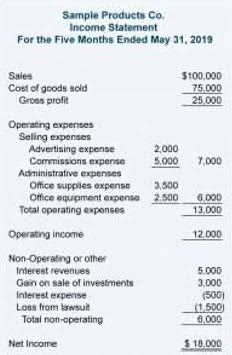
Foreign-based companies registered with the SEC use IFRS reporting guidelines in their U.S. disclosure filings. Some U.S. small and mid-size enterprises (SMEs) voluntarily use IFRS accounting procedures, which are neither expressly permitted nor prohibited under applicable U.S. laws. The GASB was established in 1984 is gaap used internationally as a policy board charged with creating GAAP for state and local government organizations. Many groups rely on government financial statements, including constituents and lawmakers. GAAP has evolved over the years, but its roots date back to the Stock Market Crash of 1929 and the subsequent Great Depression.
Key Differences
There are some key differences between how corporate finances are governed in the US and abroad. Understanding GAAP and IFRS guidelines can be an asset, no matter your profession or industry. By furthering your knowledge of these accounting standards through such avenues as an online course, you can more effectively analyze financial statements and gain greater insight into your company’s performance. GAAP is the set of standards and regulations any publicly traded company in the U.S. is legally required to follow when preparing financial documents.
Transitioning from US GAAP to IFRS
- GAAP rules in FASB ASC 210 concerning the composition of “cash available for current operations” and rules that allow or prohibit the offsetting of certain asset and liability balances.
- These governance bodies are better equipped to monitor financial performance and ensure that management’s actions align with shareholders’ interests.
- Today, the Financial Accounting Standards Board (FASB), an independent authority, continually monitors and updates GAAP.
- By being more principles-based, IFRS, arguably, represents and captures the economics of a transaction better than GAAP.
- The increased transparency and comparability fostered by IFRS can lead to more effective oversight by boards of directors and audit committees.
- Companies operating in multiple jurisdictions can achieve greater consistency in their financial statements, reducing the cost and complexity of maintaining different sets of books.
Five of these principles are the principle of regularity, the principle of consistency, the principle of sincerity, the principle of continuity and the principle of periodicity. Each principle is meant to guarantee and support clear, concise and comparable financial reporting. If a company is found violating GAAP principles, there are many possible consequences. When a company holds investments such as shares, bonds, or derivatives on its balance sheet, it must account for them and their changes in value. Both GAAP and IFRS require investments to be segregated into discrete categories based on asset type.
Inventory Valuation Methods
It is also possible, though time-consuming, to convert GAAP documents and processes to meet IFRS standards. Whether or not the two systems will ever truly integrate or converge remains to be seen, though efforts were made by the U.S. Securities and Exchange Commission from 2010 to 2012 to come up with an official plan for convergence. US GAAP and IFRS, while both designed to ensure accurate financial reporting, diverge in several fundamental ways. US GAAP is rules-based, providing detailed guidelines for virtually every accounting scenario. This approach aims to minimize ambiguity but can lead to complexity and rigidity.

If there is any additional or relevant information needed to understand the financial reports, it must be fully disclosed in the notes, footnotes or description of the report. This is true under IFRS as well, https://www.bookstime.com/ however, IFRS also requires certain R&D expenditures to be capitalized (e.g. some internal costs like prototyping). Under IFRS, the legal form is irrelevant and only depends on when cash flows are received.
This online publication presents International GAAP® 2024 in a user-friendly, easy to browse and search, digital format. Investors increasingly make their investment decisions in a global context of comparing investments in companies located in many countries that use different accounting, auditing, and other business practices. Making such comparisons is difficult, time-consuming, complex, and risky, even for seasoned professionals. Government entities, on the other hand, are influenced by a set of standards that are slightly different from GAAP. Other countries have their own GAAP rules, which differ from those in the United States.
Here’s a look at the two primary sets of accounting standards—GAAP and IFRS—and how they compare. The Great Depression in 1929, a financial catastrophe that caused years of hardship for millions of Americans, was primarily attributed to faulty and manipulative reporting practices among businesses. In response, the federal government, along with professional accounting groups, set out to create standards for the ethical and accurate reporting of financial information. Many reputable accounting degree programs teach generally accepted accounting principles as part of their curricula. This guide for accounting students explores GAAP standards and how they continue to evolve in a changing economy. By setting IFRS in a relevant business context, International GAAP® 2024 provides insights on how complex practical issues should be resolved in the real world of global corporate reporting.
Which is better: GAAP vs. IFRS?
GAAP is meant to ensure consistency, accuracy, and transparency in financial reporting and aims to provide a reliable foundation for investors to make informed decisions. While the rules established under GAAP generally improve the transparency in financial statements, they don’t guarantee that a company’s financial statements are free from errors or omissions meant to mislead investors. Always scrutinize financial statements, as there can still be room for manipulation within the framework of GAAP.

There are some similarities between GAAP and IFRS; however, there are several key differences that should not be overlooked. In the realm of asset valuation, US GAAP generally favors historical cost, providing a stable and verifiable basis for asset values. IFRS, conversely, allows for revaluation of certain assets to fair value, reflecting current market conditions.

